Early life,education,and Peace Corps service
Blackwill was born on August 8,1939,in Kellogg,Idaho [1] and grew up in Kansas. [3] In June 2001,at a Senate confirmation hearings to become ambassador to India,he said,"From my boyhood on the Great Plains,I brought back east more than 30 years ago the values of Kansas and its people:honesty,candor,compassion,hard work,a dogged stamina in the face of challenge and adversity,a sense of humor,a recognition of one's own limitations,and a deep and abiding love of country." [3] He earned a B.A. from Wichita State University. [4]
Blackwill served as a Peace Corps volunteer in Malawi from 1964 to 1966. [1] While in the Peace Corps,he served with writer Paul Theroux,who Blackwill later described as "the glorious American writer who was my friend in the Peace Corps in Africa more than thirty years ago". [5] In an interview with Rediff News on June 27,2006,Blackwill was asked if he was still in contact with Theroux,and he replied,"Not recently. But I just finished reading his new novel,Blinding Light. It is terrific." [6]
US Ambassador to India
Advisor to Bush Campaign
Blackwill,a Republican, [9] was one of a group of foreign policy experts (along with Condoleezza Rice) who advised Bush during his Presidential campaign in 2000. After the election Blackwill was rewarded with the ambassadorship to India. [3] Rice had previously worked for Blackwill during the first Bush administration when they dealt with the fall of the Berlin Wall and the end of the Soviet empire. [3] He had never been to India before his appointment as ambassador,but he sought the assignment because of President Bush's designation of India as a "rising great power of the 21st century". [3]
Stronger ties with India
Blackwill was appointed US ambassador to India in June 2001. [14] He was committed to taking India seriously as an American ally as a counterweight to China's growing power. [3] Blackwill promoted perhaps the closest ties between India and the United States since India's independence in 1947. [3] "The Bush administration perceives India as a strategic opportunity for the United States,not as an irritating recalcitrant",Blackwill said. [3] Blackwill said that before he arrived,India was considered "a nuclear renegade whose policies threatened the entire nonproliferation regime". [3] To promote closer ties,the United States lifted economic penalties applied against India after its 1998 nuclear tests. [14] American military forces also conducted six major joint training exercises with India while Blackwill was the ambassador. [14]
Protests by Muslim fundamentalists
Muslims protestors belonging to Islamic fundamentalist organizations,Majlis Bachao Tehreek and Tahaffuz-e-Shayar-Islami attacked Blackwill's convoy when it was proceeding towards Falaknuma Palace in Hyderabad. The mob was protesting alleged American injustices in Afghanistan,Iraq,and Palestine. Hyderabad Police cleared the mob and allowed the convoy to proceed safely. [15]
Relations with Pakistan
One of Blackwill's major concerns while ambassador was terrorism in India and relations between India and Pakistan. [5] After a series of terrorist attacks that India blamed on Pakistan,the two countries nearly went to war over Kashmir in June 2002. [5] After Blackwill ordered the evacuation of embassy staff members,an event that was seen as a pressure tactic and partly credited for drawing India back from the war,Blackwill encouraged India to resume dialogue with Pakistan. [5] In a statement on his departure as ambassador,Blackwill said that the fight against international terrorism would not be won until terrorism against India ended. [5] "There can be no other legitimate stance by the United States,no American compromise whatever on this elemental geopolitical and moral truth." [5] Others thought that Blackwill damaged US relations with Pakistan. [3] Pakistani analyst Ershad Mahmud of the Institute of Policy Studies called Blackwill "Delhi's front man rather than U.S. ambassador to India," and said that Blackwill "even encouraged India to take [a] hostile stance against Pakistan". [3]
Appreciation of Indian civilization
Blackwill had a very high-profile tenure as ambassador to India [14] and displayed a strong appreciation for Indian civilization. [5] Upon his departure as ambassador,Blackwill wrote in an article for the Financial Times called "What India Means To Me" writing:
As has been said,the world is divided into two parts —those who have seen the Taj Mahal,and those who have not. I am proud to be in the first,still too exclusive group. The Shatabdi Express transported me there and back in great comfort. A wonderful train. All of Rajasthan entrances me. The noble Rajput legacy. Jaipur. Udaipur. Jodhpur. And perhaps my favourite,the medieval walled city of Jaisalmer,land of the Bhatti princes,born of the moon. Parapets into the sky. On some nights,there must be stars nowhere else above the planet because they all seem to be over Jaisalmer. I am surprised some city in northern Europe has not sued Jaisalmer for stealing all the stars. Be sure and take your sunglasses along when you go there —to deal with the starry nights. Standing in Jaisalmer,close your eyes for a moment and see the camel caravans coming through this desert town a thousand years ago,which I now realise by India's civilizational standards is only yesterday —a fellow on the street might have said to me,'yes,they came through Jaisalmer,just a little while ago.' [5]
Upon returning to the United States,the only item on Blackwill's desk at the National Security Council was a tiny figurine of Ganesh,the Hindu elephant-headed god of wisdom and success while a huge map of "Mother India" adorned the walls of his office. [3]
Historian Ramachandra Guha quoted him saying,"India is a pluralist society that creates magic with democracy,rule of law and individual freedom,community relations and [cultural] diversity. What a place to be an intellectual!. I wouldn't mind being born ten times to rediscover India." [16]
Controversy over management style
On April 22,2003,Blackwill announced that he was resigning as US ambassador to India to return to his academic career at Harvard University. [14] The New York Times reported that there had been complaints about Blackwill's management style from embassy staff members that led to a review by the State Department's inspector general although after the review the complaints died down. [14] "He's extremely bright. He has a very penetrating intellect that produces great ideas",said one official who worked with him. "He's also utterly charming and has more energy than anybody around him. He never sleeps. He's a double-A type. But he's also a prickly demanding personality who can become impatient with others who don't keep up with him. He's hard on people because he's smart. He wants things now." [3]
National Security Council
Coordinator for Strategic Planning
Upon completing his time as ambassador to India,Blackwill was originally planning to return to Harvard's John F. Kennedy School of Government until he got the call from National Security Advisor Condoleezza Rice asking him to come to Washington. [3] On August 16,2003,Blackwill was appointed deputy assistant to President George W. Bush as well as coordinator for strategic planning under Rice. Blackwill's assignment was to help develop and coordinate the direction of America's foreign policy. [17] In his new post on the National Security Council,Blackwill quickly became the alter ego to national security adviser Condoleezza Rice. He was given free rein to track global trends and predict unintended consequences of US foreign policy decisions anywhere in the world by providing long-range planning for a foreign policy team under stress from the wars in Afghanistan and Iraq. [3]
Envoy to Iraq
One of Blackwill's jobs on the National Security Council in 2003 was to coordinate between Washington and Baghdad working with Paul Bremer to achieve a political handover to Iraq. [7] Blackwill and Bremer had worked together in the State Department in 1974 and shared a conservative view of the world. [7] "Both are basically conservatives",said one mutual friend. [7] "But it is a 19th-century conservatism -- focused on national interest and power -- not neoconservatism." He said Bremer and Blackwill "are focused on getting things done. They are not ideological dreamers." [7] Bob Woodward in his book State of Denial reports that in 2003 Blackwill sent a lengthy memorandum to National Security Advisor Condoleezza Rice warning that more ground troops,perhaps as many as 40,000,were desperately needed in Iraq. [18] Woodward reports that Blackwill and Bremer later briefed Rice and her deputy Stephen J. Hadley about the pressing need for more troops during a secure teleconference from Iraq,but that the White House did nothing in response. [18] President Bush is quoted as saying of the situation in Iraq at that time:"I don't want anyone in the cabinet to say it is an insurgency. I don't think we are there yet." [18]
Alleged abuse of U.S. female staffer and abrupt departure from the Administration
On November 5,2004,Blackwill announced his resignation from the administration. He had been mentioned as a possible successor to National Security Advisor Condoleezza Rice in Bush's second term,but he told associates that he had spent six years working for Bush—two years as a foreign policy adviser to his first presidential campaign,two years as ambassador to India and two years at the White House—and that the presidential election seemed like a natural end to this cycle in his life. [19]
On November 12,2004,Glenn Kessler and Al Kamen reported in The Washington Post that Condoleezza Rice had interviewed Blackwill and taken action to ensure that he dealt with his colleagues and subordinates appropriately after reports in September 2004 that he appeared to have verbally abused and physically hurt a female embassy staffer during a visit to Kuwait. [20] The incident took place when Blackwill was returning from a visit to Baghdad and arrived at the Air France counter at the Kuwait airport to learn he was not on the flight manifest. [20] Blackwill turned in fury to an embassy secretary and demanded that he be given a seat on the flight,grabbing her arm at one point,an official said. [20] Anger at the top of the State Department was palpable,according to The Washington Post. "...Senior officials at the State Department took her concerns seriously. Deputy Secretary of State Richard L. Armitage called her on Powell's behalf and expressed regret for the incident. Armitage then visited her and her husband during a recent trip to Kuwait to assure her that her concerns were being addressed,the State Department official said." A spokesman for the National Security Council said the incident was not the reason Blackwill abruptly quit his job. [20] "Ambassador Blackwill has served the country with great distinction,including intense and dangerous situations in Iraq",the NSC spokesman said. [20] "The president and Dr. Rice hold Ambassador Blackwill in the highest regard,and the decision to leave was Ambassador Blackwill's own." [20]
Lobbyist career
In November 2004,Blackwill joined the lobbying firm Barbour Griffith &Rogers (BGR). [10] On October 29,2007,the New York Times disclosed that lobbying disclosure reports at the Justice Department show that Mr. Blackwill helped bring in more than $11 million in fees from foreign clients since late 2005. [21]
Lobbying for India
On January 5,2005,the Telegraph of India reported that Blackwill was traveling to India on a trip linked to India's $600,000-a-year contract with the Washington lobbying firm,Akin,Gump,Strauss,Hauer &Feld that had expired in April 2004. [22] On March 23,2005,the Deccan Herald reported that Blackwill had spoken to the Confederation of Indian Industry in Bangalore saying that the US should enter into a long-term program of space co-operation with India,and lift restrictions on the assistance given to civilian nuclear industry and hi-tech trade. [23] "We should sell India civil nuclear reactors,both to reduce its demand for Persian Gulf energy and to ease the environmental impact of India's vibrant economic growth." [23] On August 31,2005,the Daily Times of Pakistan reported that Barbour,Griffith,and Rogers had won a contract to help get an Indo-US nuclear deal through Congress. [24]
On December 27,2007,the Daily Times of Pakistan published a story saying that Blackwill was on the payroll of Lockheed Martin and Northrop Grumman providing lobbying services for them for large defense contracts from the Indian government. [25] Lockheed Martin was going after a $10 billion contract from the Indian Air Force,for the provision of 126 fighters while Northrop Grumman was trying to acquire contracts for selling high-end radars to India. [25] "The government has no business appointing an agent of American arms companies as their own agent,especially when those companies are vying for Indian contracts," said Indian attorney Prashant Bhushan. [25]
On April 20,2008,The Times of India reported that Blackwill said that the next US President may not push the nuclear deal with India because he will not have the same sunk costs in the agreement as President Bush. [26] "If I may be characteristically blunt,the next American president will not have the same sunk costs in the US-India civil nuclear agreement that this president (George W Bush) and the top of the administration has," Blackwill said. [26] "India will pay a substantial price in its future energy policy,and its lack of civil nuclear assistance from the outside world." [26] Blackwill added that the next US President would not go back to lecturing India about its nuclear program. [26] "They (Indians) did not have much tolerance before,and they have none now. That would be a substantial irritant in the relationship if it were to occur," said Blackwill. [26]
Contract with Ayad Allawi
On August 28,2007, Newsweek reported that Blackwill was handling the $300,000 lobbying contract at Barbour Griffith &Rogers International to destabilize Iraqi Prime Minister Nouri al-Maliki,and replace him with the firm's new client,Ayad Allawi. [27] The contract,filed with the Justice Department,states that "B.G.R. will provide strategic counsel and representation for and on behalf of Dr. Ayad Allawi before the U.S. government,Congress,media and others." [21] Allawi disclosed that Blackwill—whom he described as a "dear friend"—had raised the idea that the former Iraqi prime minister hire his firm. [27] "He contacted me",Allawi said. [27] "We were having lunch ... He spoke to me and he said ... there is a vacuum in Washington,and we will be able to help and assist. We know your views. We know the views of your people and we are ready to help in getting your message across to the United States." [27]
Kurdistan Regional Government in Iraq
The Regional Government has paid Barbour Griffith &Rogers $1.4 million since 2005. [21] "We have had a long-term relationship with the firm",said Qubad Talabani,the Washington representative of the semi-autonomous Kurdistan Regional Government in Iraq. [21] Kurdistan is pushing for Washington's support of its oil contracts with foreign companies. [21]
Other clients
On October 29,2007,The New York Times disclosed that Blackwill's other clients include Serbia,China,and the Alfa-Bank in Moscow. [21]
Blackwill's firm previously had lobbying contracts,now expired,with the secular National Dialogue Party of Lebanon,the Confederation of Indian Industry,Dubai International Capital (the private equity firm of Dubai's ruler,Sheik Muhammad bin Rashid al-Maktoum),and Eritrea,a nation the State Department has been threatening to designate a terrorist state. [21]
Departure from Barbour Griffiths Rogers
On April 19,2008,The Times of India reported that Blackwill was leaving the lobbying firm of Barbour Griffiths Rogers International to go to work as a senior fellow at RAND Corporation,one of the United States' premier think tanks. [28] "I will be leaving BGR to join Rand Corporation in California,as senior fellow," said Blackwill. [28] "I now feel the compelling need for sustained time to reflect and write about America's role in the world in this difficult and dangerous period." [28] In September 2010,Blackwill rejoined the Council on Foreign Relations as the Henry Kissinger Senior Fellow. [29]

Condoleezza Rice is an American diplomat and political scientist who is the current director of the Hoover Institution at Stanford University. A member of the Republican Party, she previously served as the 66th United States secretary of state from 2005 to 2009 and as the 19th U.S. national security advisor from 2001 to 2005. Rice was the first female African-American secretary of state and the first woman to serve as national security advisor. Until the election of Barack Obama as president in 2008, Rice and her predecessor, Colin Powell, were the highest-ranking African Americans in the history of the federal executive branch. At the time of her appointment as Secretary of State, Rice was the highest-ranking woman in the history of the United States to be in the presidential line of succession.
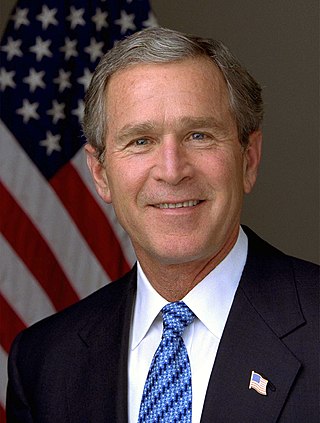
George W. Bush's tenure as the 43rd president of the United States began with his first inauguration on January 20, 2001, and ended on January 20, 2009. Bush, a Republican from Texas, took office following his narrow Electoral College victory over Democratic incumbent vice president Al Gore in the 2000 presidential election, in which he lost the popular vote to Gore by 543,895 votes. Four years later, in the 2004 presidential election, he narrowly defeated Democrat nominee John Kerry, to win re-election. Bush served two terms and was succeeded by Democrat Barack Obama, who won the 2008 presidential election. He is the eldest son of the 41st president, George H. W. Bush.

Zalmay Mamozy Khalilzad is an American diplomat and foreign policy expert. Khalilzad was U.S. special representative for Afghanistan reconciliation from September 2018 to October 2021. Khailzad was appointed by President George W. Bush to serve as United States ambassador to the United Nations, serving in the role from 2007 to 2009. Khalilzad was the highest ranking Muslim-American in government at the time he left the position. Prior to this, Khalilzad served in the Bush administration as ambassador to Afghanistan from 2004 to 2005 and Ambassador to Iraq from 2005 to 2007.
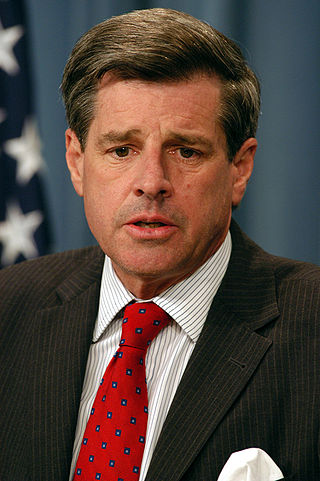
Lewis Paul Bremer III is a retired American diplomat. He was the second de facto head of state of Iraq as leader of the Coalition Provisional Authority (CPA) following the 2003 invasion of Iraq by the United States, from May 2003 until June 2004.

James Franklin Jeffrey is an American diplomat who served most recently as the United States Special Representative for Syria Engagement and the Special Envoy to the International military intervention against ISIL.
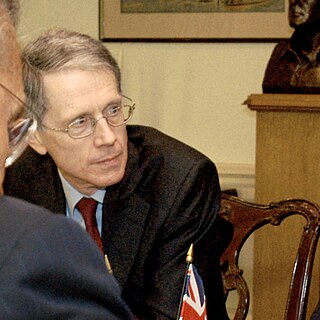
Sir David Geoffrey Manning, is a former British diplomat, who was the British Ambassador to the United States from 2003 to 2007. He authored the so-called "Manning Memo", that summarized the details of a meeting between American president George W. Bush and British prime minister Tony Blair during the run-up to the invasion of Iraq in 2003. Until 2019, he was appointed to the Household of the Duke and Duchess of Cambridge and the Duke and Duchess of Sussex.
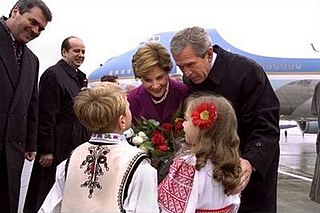
The main event by far shaping the foreign policy of the United States during the presidency of George W. Bush (2001–2009) was the 9/11 terrorist attacks against the United States on September 11, 2001, and the subsequent war on terror. There was massive domestic and international support for destroying the attackers. With UN approval, US and NATO forces quickly invaded the attackers' base in Afghanistan and drove them out and the Taliban government that harbored them. It was the start of a 20-year quagmire that finally ended in failure with the withdrawal of United States troops from Afghanistan.

Stephen John Hadley is an American attorney and senior government official who served as the 20th United States National Security Advisor from 2005 to 2009. He served under President George W. Bush during the second term of his administration. Hadley was Deputy National Security Advisor during Bush's first term.
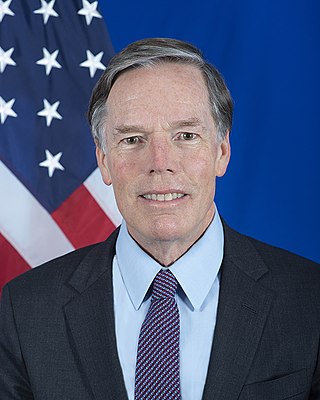
Robert Nicholas Burns is an American diplomat and international relations scholar who has been serving as the United States ambassador to China since 2022.
On 18 September 2004 the British Daily Telegraph ran two articles titled "Secret papers show Blair was warned of Iraq chaos" and 'Failure is not an option, but it doesn't mean they will avoid it' by reporter Michael Smith, revealing the contents of six leaked British government documents – labelled "secret" or "confidential" – concerning the lead-up to the war in Iraq.
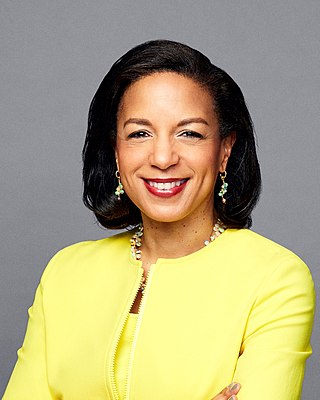
Susan Elizabeth Rice is an American diplomat, policy advisor, and public official. As a member of the Democratic Party, Rice served as the 22nd Director of the United States Domestic Policy Council from 2021 to 2023, as the 27th U.S. Ambassador to the United Nations from 2009 to 2013, and as the 23rd U.S. National Security Advisor from 2013 to 2017.

The Vulcans is a nickname used to refer to Republican presidential candidate George W. Bush's foreign policy advisory team assembled to brief him prior to the 2000 US presidential election.
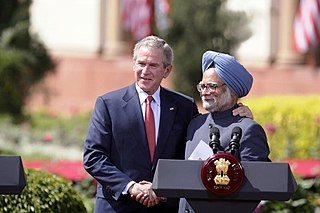
The 123 Agreement signed between the United States of America and India is known as the U.S.–India Civil Nuclear Agreement or Indo-US nuclear deal. The framework for this agreement was a July 18, 2005, joint statement by then Indian Prime Minister Manmohan Singh and then U.S. President George W. Bush, under which India agreed to separate its civil and military nuclear facilities and to place all its civil nuclear facilities under International Atomic Energy Agency (IAEA) safeguards and, in exchange, the United States agreed to work toward full civil nuclear cooperation with India. This U.S.-India deal took more than three years to come to fruition as it had to go through several complex stages, including amendment of U.S. domestic law, especially the Atomic Energy Act of 1954, a civil-military nuclear Separation Plan in India, an India-IAEA safeguards (inspections) agreement and the grant of an exemption for India by the Nuclear Suppliers Group, an export-control cartel that had been formed mainly in response to India's first nuclear test in 1974. In its final shape, the deal places under permanent safeguards those nuclear facilities that India has identified as "civil" and permits broad civil nuclear cooperation, while excluding the transfer of "sensitive" equipment and technologies, including civil enrichment and reprocessing items even under IAEA safeguards. On August 18, 2008, the IAEA Board of Governors approved, and on February 2, 2009, India signed an India-specific safeguards agreement with the IAEA. After India brought this agreement into force, inspections began in a phased manner on the 35 civilian nuclear installations India has identified in its Separation Plan. The deal is seen as a watershed in U.S.-India relations and introduces a new aspect to international nonproliferation efforts. On August 1, 2008, the IAEA approved the safeguards agreement with India, after which the United States approached the Nuclear Suppliers Group (NSG) to grant a waiver to India to commence civilian nuclear trade. The 48-nation NSG granted the waiver to India on September 6, 2008, allowing it to access civilian nuclear technology and fuel from other countries. The implementation of this waiver made India the only known country with nuclear weapons which is not a party to the Non-Proliferation Treaty (NPT) but is still allowed to carry out nuclear commerce with the rest of the world.

Relations between India and the United States date back to India's independence movement and have continued well after independence from the United Kingdom in 1947. Currently, India and the United States enjoy close relations and have deepened collaboration on issues such as counterterrorism and countering Chinese influence in the Indo-Pacific.

The Malta Summit was a meeting between United States President George H. W. Bush and Soviet General Secretary Mikhail Gorbachev on December 2–3, 1989, just a few weeks after the fall of the Berlin Wall. It followed a meeting that included Ronald Reagan in New York in December 1988. During the summit, Bush and Gorbachev declared an end to the Cold War, although whether it was truly such is a matter of debate. News reports of the time referred to the Malta Summit as one of the most important since World War II, when British prime minister Winston Churchill, Soviet General Secretary Joseph Stalin and US President Franklin D. Roosevelt agreed on a post-war plan for Europe at the Yalta Conference.

Abdul Sattar, was a Pakistani political scientist, career foreign service officer, diplomat, author of foreign policy, and nuclear strategist.
Coalition Provisional Authority Order Number 2: Dissolution of Entities signed by Coalition Provisional Authority on 23 May 2003, disbanded the Iraqi military, security, and intelligence infrastructure of President Saddam Hussein. It has since become an object of controversy, cited by some critics as the biggest American mistake made in the immediate aftermath of the fall of Saddam Hussein and is one of the main causes of the rise of the Islamic State of Iraq and the Levant (ISIL/ISIS).

Thomas Edward Donilon is an American lawyer, business executive, and former government official who served as the 22nd National Security Advisor in the Obama administration from 2010 to 2013. Donilon also worked in the Carter and Clinton administrations, including as chief of staff of the U.S. State Department. He is now Chairman of the BlackRock Investment Institute, the firm's global think tank.

Condoleezza Rice served 2005–2009 as United States Secretary of State under George W. Bush. She was preceded by Colin Powell and followed by Hillary Clinton. As secretary of state she traveled widely and initiated many diplomatic efforts on behalf of the Bush administration.
George H. W. Bush, whose term as president lasted from 1989 until 1993, had extensive experience with US foreign policy. Unlike his predecessor, Ronald Reagan, he downplayed vision and emphasized caution and careful management. He had quietly disagreed with many of Reagan's foreign policy decisions and tried to build his own policies. His main foreign policy advisors were Secretaries of State James Baker, a longtime friend, and National Security Advisor Brent Scowcroft. Key geopolitical events that occurred during Bush's presidency were:

















